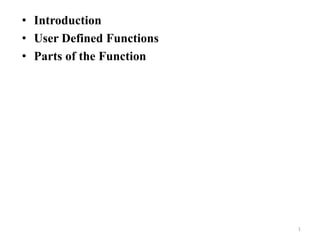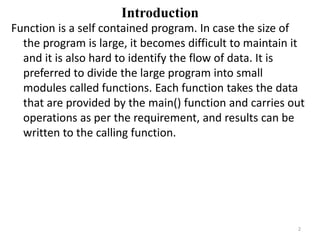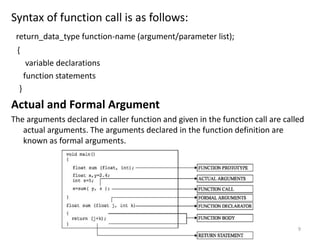User Defined Functions in C
- 1. • Introduction • User Defined Functions • Parts of the Function 1
- 2. Introduction Function is a self contained program. In case the size of the program is large, it becomes difficult to maintain it and it is also hard to identify the flow of data. It is preferred to divide the large program into small modules called functions. Each function takes the data that are provided by the main() function and carries out operations as per the requirement, and results can be written to the calling function. 2
- 3. Advantages of the functions are as follows: • Reusability: A function once written can be invoked again and again, thus helping us to reuse the code and removing data redundancy. • Modularity: Functions can help us in breaking a large, hard to manage problem into smaller manageable sub-problems. It is easier to understand the logic of sub-programs. • Reduced Program Size: Functions can reduce the size of the program by removing data redundancy. • Easy Debugging: Using functions, debugging of a program becomes very easy, as it is easier to locate and rectify the bug in the program if functions are used. • Easy Updating: If we need to update some code in the program, then it is much more easier in case we have used functions. 3
- 4. #include<stdio.h> // function prototype, also called function declaration float square ( float x ); // main function, program starts from here int main( ) { float m, n ; printf ( "nEnter some number for finding square n"); scanf ( "%f", &m ) ; // function call n = square ( m ) ; printf ( "nSquare of the given number %f is %f",m,n ); } float square ( float x ) { float p ; Function Definition p = x * x ; return ( p ) ; } 4
- 5. 5
- 6. Parts of the function Parts of a function are as follows. • Function prototype declaration • Function call • Definition of a function • Actual and formal arguments • Return statement 6
- 7. Function prototype declaration A prototype statement helps the compiler to check the return and argument types of the function. A function prototype declaration consists of function’s return type, name, and arguments list. It tells the compiler Name of the function Type of value returned The type and number of arguments The general Syntax: <Data type> <function name> (with/without arguments list with/without data types) Example : float sum (float, int); float sum (float x, int y); When the programmer defines the function, the definition of function must be same like its prototype declaration. 7
- 8. Function Call A function is a latent(hidden) body. It gets activated only when a call to a function is invoked. A function must be called by its name followed by argument, or without argument, list enclosed in parenthesis and terminated by semicolon. The general Syntax of function call is as follows: function-name(with/without argument list); Example : sum (x,y); product (x,y); Function Definition The first line is called function definition and function body follows it. The function definition and function prototype should match with each other. The function body is enclosed within curly braces. The function can be defined anywhere. If the function is defined before its caller, then its prototype declaration is optional. 8
- 9. Syntax of function call is as follows: return_data_type function-name (argument/parameter list); { variable declarations function statements } Actual and Formal Argument The arguments declared in caller function and given in the function call are called actual arguments. The arguments declared in the function definition are known as formal arguments. 9
- 10. variables y and z are actual arguments and variables j and k are formal arguments. The values of y and z are stored in j and k, respectively. The values of actual arguments are assigned to formal arguments. The function uses formal arguments for computing. The return Statement The return statement is used to return value to the caller function. The return statement returns only one value at a time. When a return statement is encountered, complier transfers the control of the program to caller function. The syntax of return statement is as follows: return (variable name); or return variable name; 10
- 11. Factorial of a Number #include <stdio.h> long factorial(int); int main() { int number; printf("Enter a number to calculate it's factorialn"); scanf("%d", &number); printf("%d! = %ldn", number, factorial(number)); return 0; } long factorial(int n) { int i; long fact = 1; for (i = 1; i <= n; i++) fact= fact * i; return fact; } 11
- 12. Sum of digits in a given number #include<stdio.h> int getSum(int num) { int getSum(int); int sum =0,r; int main() { if(num!=0) { int num,sum; r=num%10; printf("Enter a number: "); sum=sum+r; scanf("%d",&num); getSum(num/10); } sum = getSum(num); return sum; } printf("Sum of digits of number: %d",sum); return 0; } 12
- 13. PASSING ARGUMENTS The main objective of passing argument to function is message passing. The message passing is also known as communication between two functions, that is between caller and called functions. There are three methods by which we can pass values to the function. These methods are as follows: Call by value (pass by value) Call by address (pass by address) The arguments used to send values to function are known as input arguments. The arguments used to return result are known as output arguments. 13
- 14. While passing values to the function, the following conditions should be fulfilled. 1. The data type and number of actual and formal arguments should be same both in caller and callee functions. 2. Extra arguments are discarded if they are declared. 3. If the formal arguments are more than the actual arguments, then the extra arguments appear as garbage. 4. Any mismatch in the data type will produce the unexpected result. 14
- 15. Call by Value In this type, values of actual arguments are passed to the formal arguments and operation is done on the formal arguments. Any change in the formal arguments does not effect to the actual arguments because formal arguments are photocopy of actual arguments. Hence, when function is called by call by value method, it does not affect the actual contents of actual arguments. The advantage of this call by value is that actual parameters are fully protected because their values are not changed when control is returned to the calling function. 15
- 16. Call by Value #include <stdio.h> void swap(int x, int y); int main () { int a = 100, b = 200; printf("Before swap, value of a : %dn", a ); printf("Before swap, value of b : %dn", b ); swap(a, b); printf("After swap, value of a : %dn", a ); printf("After swap, value of b : %dn", b ); return 0; } void swap(int x, int y) { int temp; temp = x; x = y; y = temp; } 16
- 17. Call by Address In this type, instead of passing values, addresses of actual parameters are passed to the function by using pointers. Function operates on addresses rather than values. Here the formal arguments are pointers to the actual arguments. Because of this, when the values of formal arguments are changed, the values of actual parameters also change. Hence changes made in the argument are permanent. 17
- 18. #include <stdio.h> void swap(int *x, int *y); int main () { int a = 100, b= 200; printf("Before swap, value of a : %dn", a ); printf("Before swap, value of b : %dn", b ); /* calling a function to swap the values.* &a indicates pointer to a ie. address of variable a and * &b indicates pointer to b ie. address of variable b. */ swap(&a, &b); printf("After swap, value of a : %dn", a ); printf("After swap, value of b : %dn", b ); return 0; } void swap(int *x, int *y) { int temp; temp = *x; /* save the value at address x */ *x = *y; /* put y into x */ *y = temp; /* put temp into y */ } 18
- 19. To check wheter a given integer is prime or not using functions #include<stdio.h> int check_prime(int); main() { int n, result; printf("Enter an integer to check whether it is prime or not.n"); scanf("%d",&n); result = check_prime(n); if ( result == 1 ) printf("%d is prime.n", n); else printf("%d is not prime.n", n); return 0; } 19
- 20. int check_prime(int a) { int c; for ( c = 2 ; c <= a - 1 ; c++ ) { if ( a%c == 0 ) return 0; } if ( c == a ) return 1; } 20



















